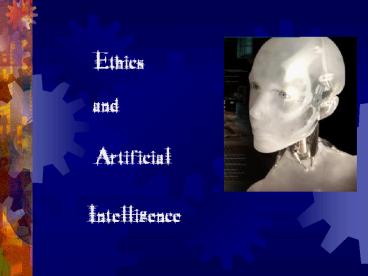Ethics - PowerPoint PPT Presentation
1 / 24
Title:
Ethics
Description:
However, caution has also been urged by those who see the potential for harm in AI: ... AI may 'rehumanize' society as we have more time to devote to ... – PowerPoint PPT presentation
Number of Views:89
Avg rating:3.0/5.0
Title: Ethics
1
Ethics
and
Artificial
Intelligence
2
From our earliest beginnings, mankind has
contemplated a future in which our creations can
replace human labour.
3
If every tool, when ordered, or even of its own
accord, could do the work that befits it, just as
the creations of Daedalus moved of themselves . .
. If the weavers' shuttles were to weave of
themselves, then there would be no need either of
apprentices for the master workers or of slaves
for the lords. Aristotle (from Atheniensium
Republica)
4
However, caution has also been urged by those who
see the potential for harm in AI
since we do not now have any ways of making
computers wise, we ought not now to give
computers tasks that demand wisdom. (Joseph
Weizenbaum, Computer Power 227)
5
In this presentation, I will focus on the ethical
dilemmas associated with AI as they pertain to
human beings
not our creations.
6
What are our fears?
7
Patricia Warrick identifies four themes in Mary
Shelley s Frankenstein that re-emerge in science
fiction over the ages
1) Promethean Theme man stealing knowledge from
the gods unintended for our use.
2) Ambiguity of Technology will what we create
ultimately benefit or hinder humanity?
3) Irresponsibility of Science a lack of
foresight and ethical concern associated with
science.
4) Reversal of Master-Servant Role technology
created to serve humanity becomes its master.
8
In this presentation, the main focus will be on
two of Warricks pervasive themes as they relate
to AI
1)Ambiguity of Technology
2)Reversal of Master- Servant Role
9
In her article addressing the ambiguity we feel
towards the role of technology in our lives,
Margaret Boden raises some interesting points.
10
On the positive side
- AI could expand our capacity for knowledge,
creativity, and problem solving - In the classroom, computer-assisted AI wouldnt
undermine student progress and self-esteem - AI may rehumanize society as we have more time
to devote to humanistic endeavours
11
On the negative side
- Without political or social controls, AI may
endanger humanity (ie. military defense) or
impede our autonomy and privacy (ie. government
databases) - What would be the social costs of an automated
work force where the work of a few supported the
many? - How would such changes affect who we are and our
attitudes towards what we value?
12
Nick Bostrom suggests other frightening insights
related to AI
Artificial minds can be easily copied.
Human-level artificial intelligence leads
quickly to greater-than-human-level artificial
intelligence.
Technological progress in other fields will be
accelerated by the arrival of artificial
intelligence.
Unlike other technologies, artificial
intelligences are not merely tools. They are
potentially independent agents.
13
Yikes!!
Might this lead to a reversal of Master-Servant
roles?
14
Raymond Kurzweil writes about the arrival of a
Second Industrial Revolution in the prologue to
his book The Age of Intelligent Machines (1990).
This AI Revolution will impact our lives in
several ways
15
Economic Impact
- Scarcity of jobs (especially mentally
unstimulating ones) - Fewer blue collar and white collar jobs
- Challenge to our Protestant work ethic
- Countries that discourage independent thought in
their citizens will be at a disadvantage when AI
revolutionizes menial work - Countries with access to technology and resources
will be key players in the future
16
Educational Impact
- Machines in the classroom would be
non-judgemental teachers incapable of errors - Machines may not motivate or inspire students
- A change in educational focus to learning how to
learn - A need for knowledge workers
- and others to continue learning
- throughout their lifetimes
17
Medical Impact
- Devices designed to give advanced warning before
our bodily systems are endangered - Doctors and nurses relegated to marginalized
roles - People take more responsibility for their own
health using machines to diagnose their problems
and propose treatment - Silicon chips to replace damaged nerve cells
- Robotic surgeons to increase precision
18
Military Impact
- Laser and particle beam weapons
- Smart weapons
- Planes without pilots
19
Social / Re-humanizing Impact
- Less need for an urbanized workforce as people
move away from cities - More devices available to assist handicapped
people - Increase in the value of interpersonal relations
as machines are impersonal - Direct relationship between
- increased leisure time and
- increased social contact
- Impact of less competition
- in the workforce
20
I believe that in the short term, AI will
continue to bring us many useful devices that
will enhance our quality of life
Medical advances
Leisure opportunities
Communication devices
Entertainment options
Labour-saving devices
21
Human nature being what it is, however, at some
point in the near future we will be faced with
the question
Just because we CAN do something, does that mean
we SHOULD?
22
Who will make these decisions?
On whose authority?
Once weve reached this point, will it be too
late to choose a different path?
23
The decisions we make today are all steps towards
a future we may not be prepared for
will we recognize ourselves by the end of this
century?
24
References
Boden, M. The Age of Intelligent Machines.
(1990) http//www.kurzweilai.net/meme/frame.h
tml?main/articles/art0162.html
Bostrom, N. When Machines Outsmart Humans.
Futures. Vol. 357, pp.759-764, 2000.
http//www.nickbostrom.com/2050/outsmart.html
Davies, O., ed. The Omni Book of Computers and
Robots. New York Kensington Publishing
Corp., 1982.
Kurzweil, R. The Age of Intelligent Machines
1990. http//www.kurzweil
ai.net/meme/frame.html?main/meme/
Warrick, P. The Cybernetic Imagination in
Science Fiction. Cambridge, Mass. MIT
Press, 1980.
Weizenbaum, J. Computer Power and Human Reason.
San Francisco, CA W.H. Freeman, 1976.
http//www.gslis.utexas.edu/palmquis/courses/revi
ews/amy.htm































